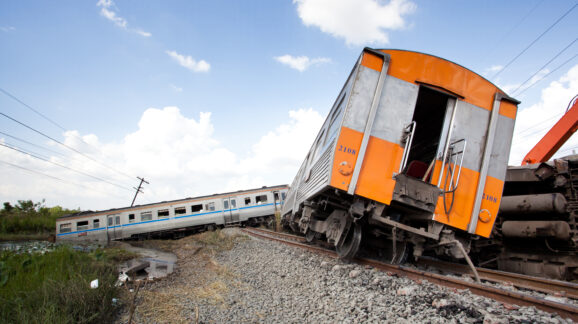East Palestine Report: Congress Should Rethink Its Reaction
The Railway Safety Act should be withdrawn in light of new recommendations.
In almost a decade working for the British Department for Transport, no officials impressed me as much as the accident investigators. They were dedicated experts who focused on what actually happened in a transportation accident, and what recommendations would prevent it from happening again. Their American equivalents have set themselves to the same task, and have released a summary of their findings concerning the East Palestine, Ohio, rail accident. Congress would do well to implement their findings.
What is immediately apparent in the recommendations from the National Transportation Safety Board is that the congressional reaction two weeks after the accident, the proposed Railway Safety Act, does not adequately address the circumstances of the accident.
In pressing for regulations like minimum crew size, speed restrictions, and increased manual inspections, which the investigation either discounted or said would have been unlikely to prevent the accident, the bill before Congress represents a rush to judgment. Now that the results are in, the bipartisan bill should be withdrawn, as should similar proposals recently unveiled in the House.
Indeed, from the board’s recommendations, it seems that most of the actions regulators can take to fix the causes of the accident are already within their powers. One way Congress could help is by passing legislation requiring inward-facing recorders on trains for audio and visual recordings, which would aid future investigators.
Everything else the board recommends is either within the powers of private bodies like the Norfolk Southern Railway, or within the powers of regulators like the Federal Railroad Administration, the Pipeline and Hazardous Materials Safety Administration, and state and local agencies.
The report reveals that there is ongoing disagreement among experts over the best handling of certain chemicals in an emergency. The railroad industry, with support from some experts, argues there is a need to vent and burn containers of the chemical vinyl chloride monomer. The board suggests that venting and burning was not needed, and that experts’ disagreement should have been conveyed to the authorities involved in the response. The board, the chemicals industry, and the transportation industry it works with should do further research and training on this issue.
Such applications of hindsight are exactly why investigations of accidents are necessary. They reveal what we don’t know about appropriate safety handling when things go wrong, and therefore where more research is needed.
Hence the most important recommendation from the board contradicts the most relevant section of the proposed Railway Safety Act. The board recommends detailed research into the effectiveness of trackside wheel-bearing defect detectors, and then formulating regulations based on the results. The Railway Safety Act, by contrast, simply mandates certain requirements for detectors with no regard for the cost or benefits.
That is not a helpful approach to rail safety. Mandates should always be predicated on the best available research. That is why the Railway Safety Act’s mandates on crew size particularly missed the mark: Research shows no benefits from larger crew sizes, as the Federal Railroad Administration itself has recognized. The demand for larger crew sizes likely emanates chiefly from labor unions, who would certainly benefit from having more members.
Meanwhile, the railroad operator itself, Norfolk Southern, is already paying dearly for the East Palestine accident. In addition to a $15 million fine, it has agreed to pay the federal government almost $300 million in damages, including paying for physical and mental-health monitoring for those possibly affected by the accident. On top of that, it is paying $600 million to settle a class-action suit launched against it. In total, the company will be paying around $1 billion for its role in the accident. That makes the Railway Safety Act’s proposed maximum civil-penalties provision of $10 million seem rather underwhelming.
